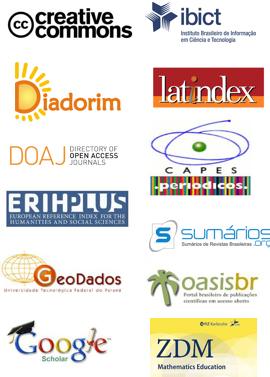Matemática Financeira na Formação Docente Inicial
DOI:
https://doi.org/10.17921/2176-5634.2021v14n3p360-364Resumo
Resumo
Este artigo tem como objetivo discutir quais saberes docentes são potencializados a partir de conceitos advindos da matemática financeira no processo de formação inicial docente. Para isso, seguindo pressupostos da pesquisa qualitativa de cunho descritivo bibliográfico, inicialmente é apresentada uma discussão referente às tipologias de saberes docentes encontradas na literatura acadêmica relativas à matemática financeira e educação financeira, com foco na educação básica. Ressalta-se que a matemática financeira consta nos documentos curriculares oficiais como uma das importantes habilidades a ser desenvolvida nos vários anos de escolaridade da educação brasileira. Para tanto, o professor de matemática deve, necessariamente, ter conhecimentos matemáticos relacionados a esta temática, tais como, taxas de juros, inflação, aplicações financeiras, impostos, módulos de financiamentos, dentre outros. apropriados em sua formação para que, assim, esteja apto a formar cidadãos responsáveis, críticos, reflexivos e conscientes frente a diversas situações que envolvam finanças. Além de ter acesso ao conhecimento do conteúdo em si, o conhecimento curricular será potencializado a partir do momento em que o docente perceber como um conhecimento serve de base para a construção de outros. A análise de tais discussões permite inferir que abordar a matemática financeira nos processos de formação inicial docente pode favorecer o desenvolvimento do conceito da educação financeira, uma vez que a matemática financeira na perspectiva crítica, representa uma grande parte dos saberes necessários docente para a sua prática pedagógica.
Palavras-chave: Educação Matemática. Formação de Professores. Matemática Financeira. Saberes Docente. Educação Financeira.
Abstract
This article aims to discuss which teachers' knowledge is enhanced from concepts arising from financial mathematics in the initial teacher education process. For this, following the assumptions of qualitative research of bibliographic descriptive nature, initially a discussion is presented regarding the types of teaching knowledge found in academic literature related to financial mathematics and financial education, with a focus on basic education. It is noteworthy that financial mathematics appears in official curriculum documents as one of the important skills to be developed in the various years of schooling in Brazilian education. Therefore, the mathematics teacher must necessarily have mathematical knowledge related to this topic, such as interest rates, inflation, financial investments, taxes, financing modules, among others. appropriate in their training so that they are able to train responsible, critical, reflective and conscientious citizens in face of various situations involving finance. In addition to having access to knowledge of the content itself, curricular knowledge will be enhanced from the moment the teacher realizes how one knowledge serves as a basis for the construction of others. The analysis of such discussions allows us to infer that approaching financial mathematics in the processes of initial teacher education can favor the development of the concept of financial education, since financial mathematics in a critical perspective represents a large part of the knowledge needed by teachers for its practice pedagogical.
Keywords: Mathematics Education. Teacher training. Financial math. Teacher Knowledge. Financial education.


